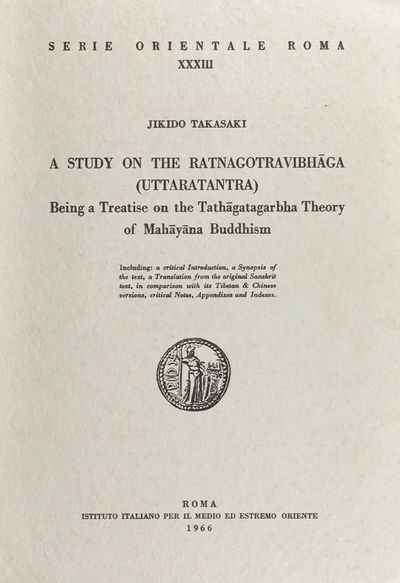- List of Abbreviationsix
- Prefacexi
- Introduction1
- I. The Ratnagotravibhāga, its Text, Translation, and Traditions concering the Author5
- 1. Text5
- 2. Translations & Traditions concerning the Author6
- II. The Structure of the Text10
- 1. Basic Text and Commentary10
- 2. Chinese Account of the Basic Verses12
- 3. Supposed Form of the Original Text18
- 4. The Commentary and Later Additions19
- III. Keypoint of the Discourse20
- 1. Ratnagotra, the Germ of the Three Jewels20
- 2. 4 Aspects of the Germ23
- 3. The Absolute26
- IV. Genealogy of the Tathāgatagarbha Theory32
- 1. Sources of the Ratnagotravibhāga32
- 2. Cittaprakrti and Āganutukakleśa34
- 3. Buddhajñana in the Avatamsaka35
- 4. The Tathāgatagarbhasūtra36
- 5. The Āryaśrīmālāsūtra37
- 6. The Anūnatvâpūrnatvanirdeśa and the Mahāparinirvānasūtra39
- 7. The Mahāyānasūtrâlankāra40
- V. Works on the Tathāgatagarbha Theory Contemporary with or Succeeding
the Ratna.45- 1. The Mahāyanadharmadhātvaviśesaśāstra45
- 2. The Buddhagotraśastra47
- 3. The Anuttarâśrayasūtra49
- 4. The Lankāvatāra and the Mahāyānaśraddhôtpādaśāstra53
- VI. The Position of the Ratna. in Mahāyāna Buddhism54
- 1. The Ratna. as a Criticism on the Prajñāpāramitā54
- 2. The Ratna. and the Vijñānavāda57
- 3. Consideration on the Date and Authorship of the Ratna.61
- I. The Ratnagotravibhāga, its Text, Translation, and Traditions concering the Author5
- Synopsis of the Text63
- Translation and Notes135
- I. Introduction141
- 1) The Meaning of the Adamantine Subjects141
- 2) Authorities on the 7 Subjects 143
- 3) The Essential Character of the 7 Subjects146
- 4) The Inherent Connection among the 7 Subjects153
- II. The Jewel of the Buddha155
- 1) The eightfold Quality of the Buddhahood156
- 2) Reference to the Jñānâlokâlaṅkārasūtra159
- III. The Jewel of the Doctrine163
- 1) The Eightfold Quality of the Doctrine164
- 2) Nirodhasatya & Mārgasatya165
- 3) The Doctrine as the Truth of Extinction165
- 4) The Doctrine as the Truth of Path168
- IV. The Jewel of the Community172
- 1) Manner and Extent of Perception173
- Ia) Right Manner of Perception174
- b) Unlimited Extent of Perception175
- 2) Introspective Character of Bodhisattva’s Perception176
- 3) Superiority of Bodhisattva’s Community176
- 1) Manner and Extent of Perception173
- V. The 3 Jewels as Refuges180
- 1) 3 Refuges from the Empirical Standpoint180
- 2) The Doctrine and the Community are not the ultimate refuge181
- 3) Only the Buddha is the Refuge from the ultimate Standpoint184
- 4) The Meaning of the 3 Jewels185
- VI. The Germ of the 3 Jewels in 4 Aspects186
- 1) Inconceivability of the 4 Aspects188
- 2) The Germ as Cause and Conditions of the 3 Jewels in its 4 Aspects194
- VII. The Sermon: All Living Beings are possessed of the Tathāgatagarbha196
- VIII. Analysis of the Germ from 10 Points of View199
- (I) Svabhāva & (II) Hetu200
- 1) The Nature of the Essence of the Tathāgata200
- 2) Obstructions and Causes for Purification201
- (III) Phala & (IV) Karman207
- 1) The 4 Supreme Virtues as the Result of Purification208
- 2) Concordance between the 4 Supreme Virtues and the 4 Causes for Purification210
- 3) 4 Impediments to the Attainment of the Supreme Virtues214
- 4) Motives of the 4 Supreme Virtues218
- 4') The Unstable Nirvāṇa219
- 5) Functions of the Germ for its Purification221
- (I) Svabhāva & (II) Hetu200
(V) Yoga 225 1) The Union of the Germ to the Factors of its Purification .... 225 2) The Union of the Germ to the Result of Purification 227 (VI) Vrtti (Manifestation) 229 (VII) Avasthäprabheda (Different States of Manifestation) 230 (VIII) Sarvatraga (All-pervadingness) 233
- Appendixes
- I. Supposed for of the Original Śloka-grantha393
- II. Corrections & Emendations to the Sanskrit Text396
- III. Description of the Ultimate Reality by Means of the Six Categories400
- Indexes
- 1. Index of Sanskrit Terms411
- 2. Index of Works, Authors & Schools437


